The 15 races that will decide the Senate, ranked
The Republican Party currently holds 53 U.S. Senate seats. To regain control of the Senate, Democrats need to net either three or four seats this November: three if their presidential nominee, Joe Biden, wins the White House; four if President Trump returns for a second term. (The sitting vice president breaks a 50-50 tie.)
Can Democrats do it? Or will the GOP keep power? Recently, things have been trending in Democrats’ direction. In South Carolina, challenger Jaime Harrison, propelled by nationwide progressive animosity toward incumbent Sen. Lindsey Graham, just raised more money in one quarter ($57 million) than any Senate candidate in U.S. history; a few days later, the authoritative, nonpartisan race handicappers at the Cook Political Report moved three GOP seats — in Alaska, Texas and Georgia — a step toward the Democrats.
With Republicans near certain to gain one Democratic seat (in Alabama) and Democrats highly favored to gain two Republican seats (in Colorado and Arizona), the fight for the Senate is going to come down to a handful of key races that are still too close to call. Here is Yahoo News’ ranking of the 15 seats that could change hands on Election Day — ordered from most to least likely to flip, with Republican-held seats noted in red and Democratic-held seats in blue.
1. Alabama: Sen. Doug Jones (D) vs. Tommy Tuberville (R)
Latest poll: Tuberville, 54 percent; Jones, 42 percent


This is one of the few Senate races where a Republican looks likely to pick up a seat held by Democrats; in a cycle with few certainties, Jones has been considered a long shot ever since the GOP managed to keep former state Judge Roy Moore from securing his party’s nomination. It was Moore, after all, who lost the seat in 2017 in a contest to replace former Sen. Jeff Sessions, allowing Jones to become the first Democrat in 20 years elected to the U.S. Senate from Alabama. Jones is a former U.S. attorney who prosecuted two of the Ku Klux Klan members responsible for the 1963 bombing of the 16th Street Baptist church in Birmingham, which killed four young girls and injured more than a dozen others. But Tuberville, a former college football coach who spent a decade leading Auburn, one of the state’s two great programs, emerged from the GOP primary this year ahead of Moore and then defeated Sessions himself in a runoff — with Trump’s backing.
2. Colorado: Sen. Cory Gardner (R) vs. John Hickenlooper (D)
Polling average: Hickenlooper, 50.4 percent; Gardner, 41.8 percent

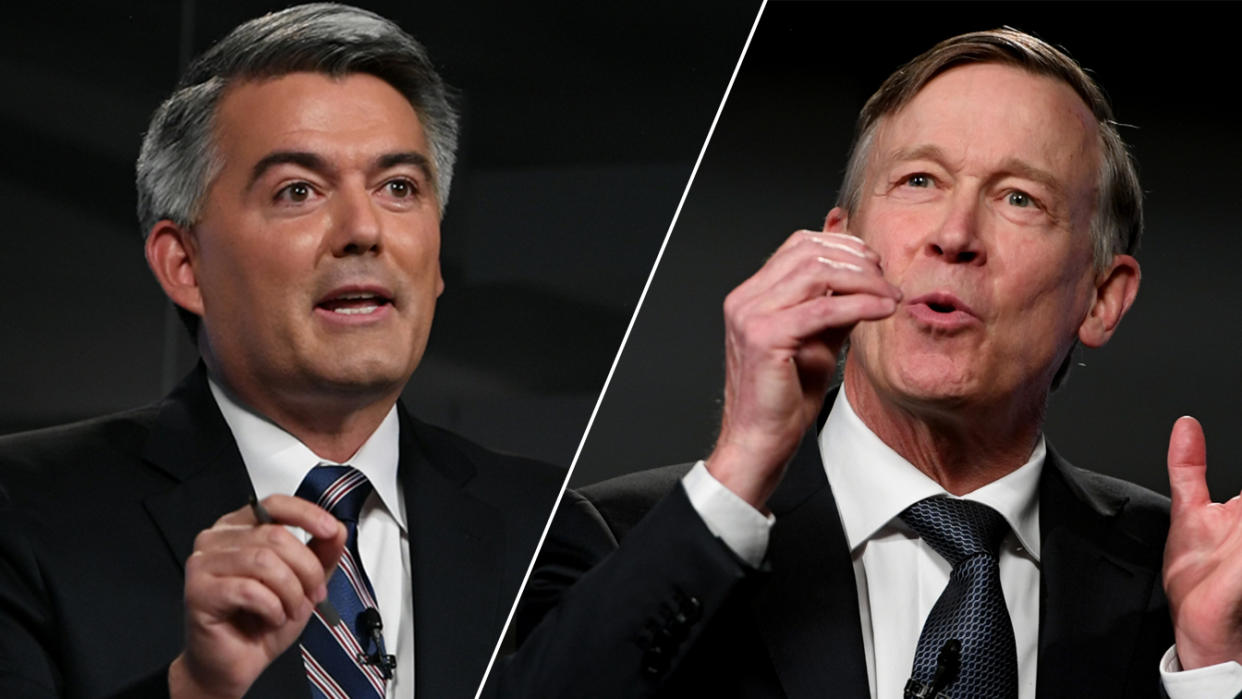
Gardner was elected during the Republican wave of 2014 and proceeded to watch the purple state he represented shift to the left enough that his prospects for reelection are perhaps the grimmest of any GOP incumbent. Gardner defeated incumbent Mark Udall by 2 points in 2014, and since then the state has gone blue by increasingly comfortable margins, with Democrats winning the 2016 presidential and Senate contests by 5-plus points and the 2016 gubernatorial race by 10. Gardner is now a senator who votes with Trump 90 percent of the time trying to win reelection in a state Biden could win by double digits.
The beneficiary of Colorado’s leftward lurch is Hickenlooper, the former governor and Denver mayor who ran in this cycle’s presidential primary as a moderate, insisting he had no interest in the Senate before jumping into the race. Hickenlooper’s campaign announced it raised $22 million in the third quarter of 2020, amid a flood of money that followed the death of Supreme Court Justice Ruth Bader Ginsburg. After supporting Republicans’ blockade of Supreme Court nominee Merrick Garland in 2016, Gardner has said he will vote to confirm Amy Coney Barrett to the bench, likely sealing his fate in November. A SurveyUSA poll last week found Hickenlooper with a 9-point lead.
3. Arizona: Sen. Martha McSally (R) vs. Mark Kelly (D)
Polling average: Kelly, 49.6 percent; McSally, 41.6 percent

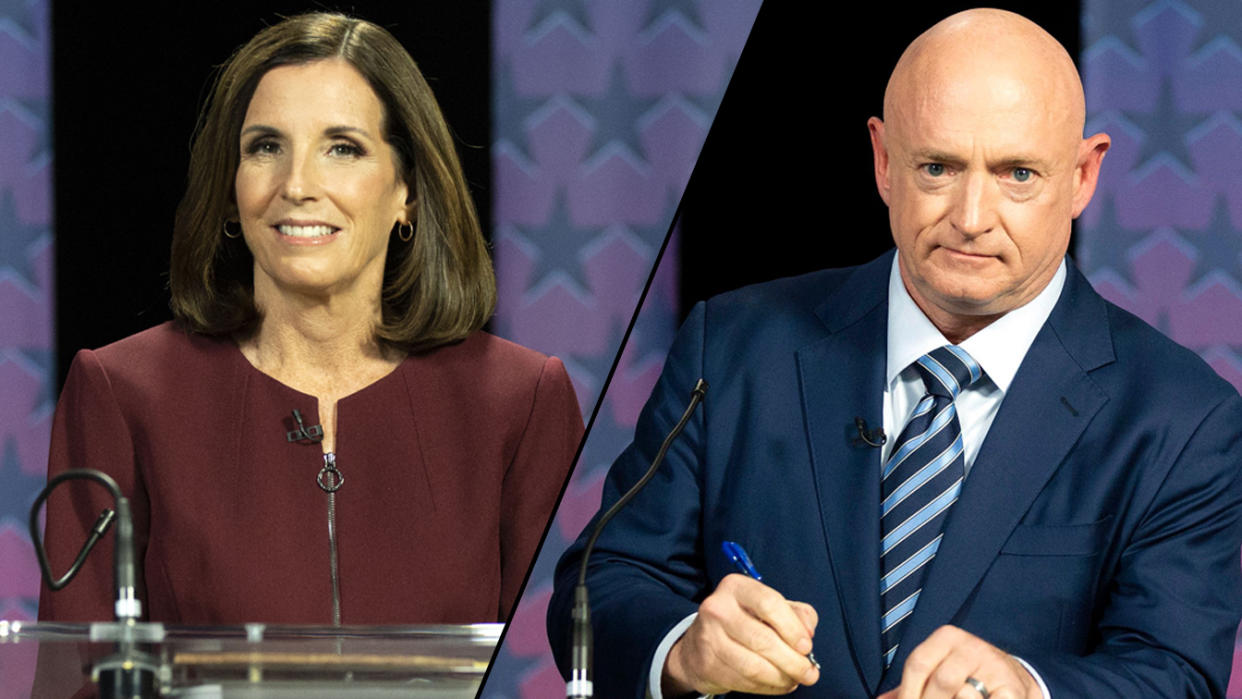
McSally has never won election to the Senate; she was appointed in 2019 to fill the seat of the late Sen. John McCain after running and losing to Democrat Kyrsten Sinema the year before. And now McSally, an accomplished Air Force veteran who was the first woman to fly a fighter jet in combat and to command an air squadron, is trailing Democrat Mark Kelly by a sizable margin. Kelly is a former astronaut whose wife, retired Democratic Rep. Gabby Giffords, was shot in the head and nearly killed in 2011. The couple responded to the attack by becoming two of America’s leading advocates for limits on gun ownership. Kelly launched his campaign nearly two years ago with a powerful four-minute biographical video and has led McSally ever since. Meanwhile, McSally has tied herself closely to Trump but has lagged behind him in the polls — even as Trump trails Biden in what is sure to be one of the most closely watched swing states on election night.
4. North Carolina: Sen. Thom Tillis (R) vs. Cal Cunningham (D)
Polling average: Cunningham, 48 percent; Tillis, 42.4 percent


Cunningham led Tillis all summer, and the Republican incumbent — a savvy politician who previously served as speaker of the North Carolina House of Representatives — looked like he was in deep trouble, trailing by an average of 6 points. But then, in early October, Cunningham admitted he had engaged in an extramarital affair over the summer with the wife of a man he served alongside in the military. That revelation shook up the race and dented Cunningham’s image as a wholesome Iraq veteran and married father of two. One Democratic consultant, Patrick Dillon, called Cunningham’s conduct “astonishingly dumb,” and Tillis has run an ad that highlights the affair and ends with a shot of him and his wife walking hand in hand.
Yet three polls released since the news broke all show Cunningham retaining his lead: 48 percent to 44 percent in a new survey from Monmouth University; 49 percent to 39 percent in a SurveyUSA poll conducted for WRAL-TV; and 47 percent to 41 percent in a poll from Morning Consult. If Tillis (who is currently recovering from COVID-19) rides the scandal to a win, Cunningham’s personal failings could end up having enormous political consequences. But the North Carolina contest may ultimately prove that partisanship outweighs morality in the Age of Trump.
5. Maine: Sen. Susan Collins (R) vs. Sara Gideon (D)
Polling average: Gideon, 46 percent; Collins, 42.3 percent

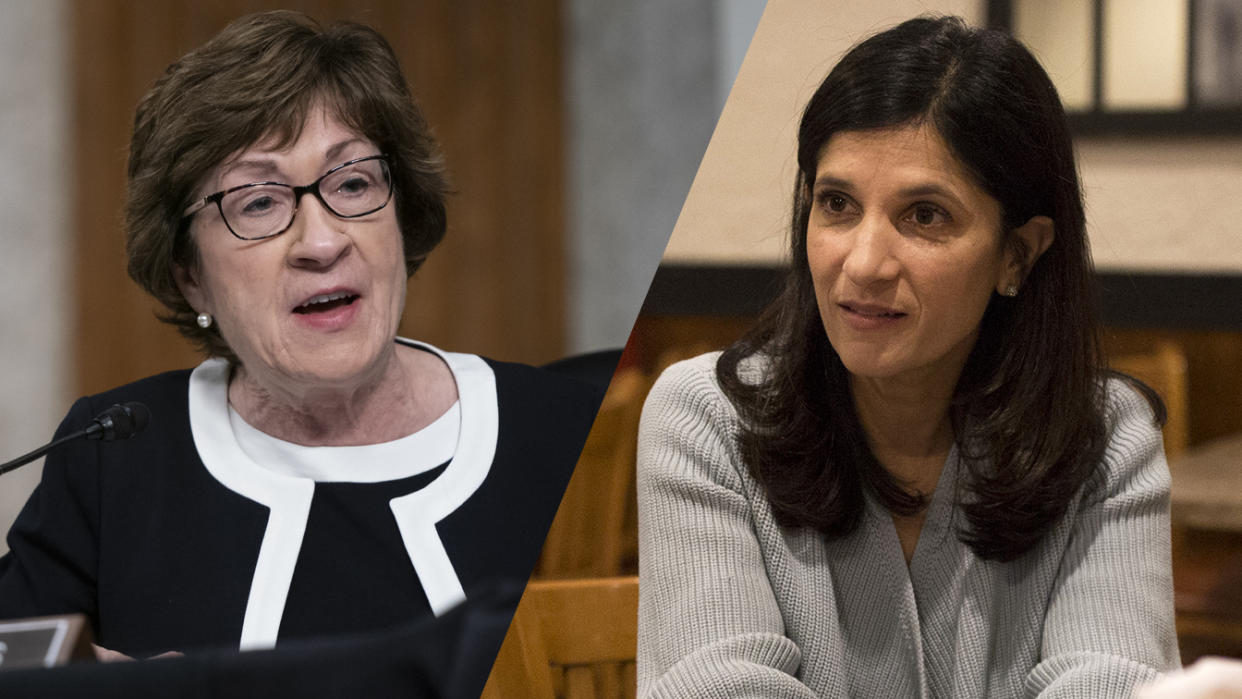
In a state that refers to anyone not born within its borders as “from away,” Collins’s roots go back several generations, and she has represented Maine in the U.S. Senate for 24 years. But the Trump presidency may have broken her bond with her home state. Two moments in particular have served to crystallize frustration with Collins and compromise her reputation as an independent-minded centrist: one, her vote for Supreme Court Justice Brett Kavanaugh in 2018, and two, her vote against convicting Trump in the Senate impeachment trial earlier this year. When it has counted most, critics say, Collins has been more loyal to Trump than to the people of Maine.
Collins’s Democratic challenger, Sara Gideon, is the speaker of Maine’s House of Representatives and 20 years Collins’s junior. Polling has shown Gideon with a consistent lead, though that has shrunk in recent days. Collins is trying to make the race less about national politics and more about the ways she helps procure federal assistance for the state, most recently in response to the COVID-19 pandemic. Collins has also criticized Trump’s decision to try to fill the Supreme Court seat left vacant by the death of Ruth Bader Ginsburg so close to the election and announced she will vote against his nominee, Judge Amy Coney Barrett. But it may not be enough to save her.
6. Iowa: Sen. Joni Ernst (R) vs. Theresa Greenfield (D)
Polling average: Greenfield, 47.3 percent; Ernst, 42.5 percent


Trump won Iowa by more than 8 points in 2016 and is still running roughly even with Biden in the state. But Ernst, a first-term senator whose debut 2014 campaign ad touted her hog-castrating skills and promised that her comfort with cutting pork would “make ’em squeal” in Washington, has trailed challenger Greenfield in every poll since the start of September.
Speaking at August’s Republican National Convention, Ernst tied herself closely to Trump as a fellow friend of “flyover country” who would stop “liberal coastal elites and radical environmentalists” from transforming the United States into a place “where farmers are punished, jobs are destroyed and taxes crush the middle class.”
The problem is that Greenfield’s message seems to be resonating, with its bread-and-butter promises to preserve health insurance coverage for people with preexisting conditions and protect Social Security from privatization, which Ernst hasn’t ruled out. As Greenfield frequently notes on the trail, her husband died when she was pregnant with their second child, forcing her to rely on Social Security survivor benefits to make ends meet. In response, Ernst has argued that an influx of out-of-state donations for Greenfield, a real estate executive, indicate that she is beholden to “liberal extremists.”
7. Montana: Sen. Steve Daines (R) vs. Gov. Steve Bullock (D)
Polling average: Daines, 48.3 percent; Bullock, 45 percent


Montana shouldn’t be competitive. In 2016, Trump beat Hillary Clinton by more than 20 points in Big Sky Country, and Daines, the Republican incumbent, has solid approval ratings. But the race immediately became a toss-up when national Democrats finally persuaded a reluctant Bullock, the state’s Democratic governor, to join the fray earlier this year. At the time, Bullock was fresh off a failed presidential bid that saw his middle-of-the-road, middle-of-the-country politics falling flat in a crowded Democratic primary. Yet Bullock’s brand is a good fit for populist, independent-minded Montana, and voters there have largely approved of his handling of the pandemic and his health-care-centric message. In a sign of how crucial the contest is, spending so far has topped $75 million — a record in Montana.
General goodwill may not be enough to put Bullock over the top in a crimson state during a presidential election year, and Daines’s strategy — to follow Trump’s playbook and paint his moderate opponent as a puppet of out-of-state donors and “liberal mobs” hell-bent on defunding the police — could carry the day. But if Biden rides a national wave to the White House, Montana could tip the Senate in the Democrats’ favor. Of all this year’s red state races, it may be the most ripe for an upset.
8. Georgia: Sen. Kelly Loeffler (R) vs. Rep. Doug Collins (R) vs. Raphael Warnock (D)
Polling average: Warnock, 29.7 percent; Loeffler, 23.5 percent; Collins, 21.7 percent


Warnock is a Christian minister who is the pastor of the historic Ebenezer Baptist Church in Atlanta, the congregation of Martin Luther King Sr. and Jr. He leads a crowded field, but he has yet to approach 50 percent in the polling — so this race, a special election to fill the seat vacated when former Sen. Johnny Isakson retired at the end of 2019, is likely headed for a Jan. 5 runoff between the top two finishers. (That’s unless Biden beats Trump by a historic margin in November and wins Georgia or comes close. In that scenario, Biden’s coattails could theoretically pull Warnock past the 50 percent mark.)
A runoff would pit Warnock against whoever wins the two-way Republican contest between Loeffler and Collins. Loeffler holds only a narrow lead over Collins, despite boasting the support of Georgia Gov. Brian Kemp and Senate Majority Leader Mitch McConnell. That’s because Loeffler is a political newcomer whose conservative bona fides are in question, given her background as a wealthy businesswoman who has occasionally donated money to Democrats. Collins, meanwhile, has endeared himself to grassroots Republicans in Georgia and built something of a national profile by defending Trump during last year’s House impeachment trial. Nathan Deal, the Republican governor of Georgia who preceded Kemp, has endorsed Collins. Unusually, Trump has remained on the sidelines.
9. Georgia: Sen. David Perdue (R) vs. Jon Ossoff (D)
Polling average: Perdue, 46.1 percent: Ossoff, 43.3 percent


Perdue, a former corporate executive, is seeking reelection to a second term. He’s been a loyal Trump vote in the Senate and has kept a relatively low profile. Ossoff ran for a U.S. House seat in 2017 and attracted national attention as the race galvanized Democratic opposition to Trump, but he still lost by 3 points to Republican Karen Handel. Perdue leads Ossoff by an average of 3 points and is favored to win. Yet the closeness of the race demonstrates the degree to which the political winds are boosting Democrats this year — and could potentially make for an upset on Nov. 3.
10. Kansas: Rep. Roger Marshall (R) vs. state Sen. Barbara Bollier (D)
Polling average: Marshall, 45 percent; Bollier, 42.3 percent


The last time a Democrat won a U.S. Senate seat in Kansas? 1932. But Bollier could make history in November. Despite its hard-core conservative reputation, Kansas has been inching away from the GOP in the wake of Gov. Sam Brownback’s disastrous 2012-2013 Kansas tax cut experiment, which blew a $900 million hole in the state budget and forced schools to shorten their schedules due to staffing shortages. In 2018, the Sunflower State elected a Democratic governor, Laura Kelly, and the first openly gay Native American member of Congress, Democratic Rep. Sharice Davids.
The moderate Bollier, an anesthesiologist, state senator and former Republican who switched parties in 2018, is hoping to continue that Democratic winning streak by defeating Marshall, an anti-abortion establishment Republican who beat far-right Kansas Secretary of State Kris Kobach in the GOP primary. A recent internal Republican poll showed Marshall ahead by 4 points; Bollier’s own internal poll showed her ahead by 2 points. The public polls have been equally close. One sign that Republicans are worried: A few weeks after investing $5.2 million in Kansas, the Mitch McConnell-aligned super-PAC Senate Leadership Fund just shelled out another $7.2 million to bolster Marshall. Overall, Bollier has outraised her Republican rival by more than $5 million, according to the latest figures from OpenSecrets.
11. South Carolina: Sen. Lindsey Graham (R) vs. Jaime Harrison (D)
Polling average: Graham, 46.2 percent; Harrison, 45.3 percent

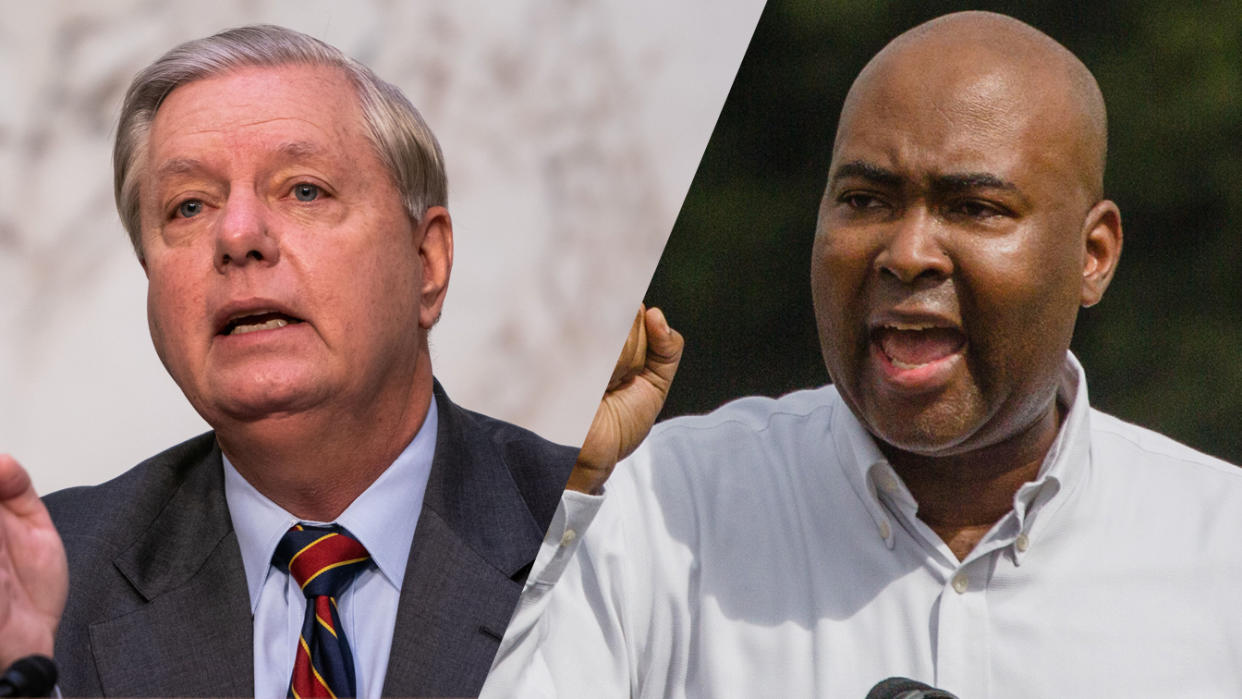
A seat that was initially seen as safe for Republicans officially became a toss-up last week, according to the nonpartisan Cook Political Report. Graham has represented the Palmetto State since 2003, and he cruised to reelection in 2014. But now he’s drawn a formidable foe. Harrison, who is Black, is a South Carolina native who attended Yale and Georgetown Law before serving as chairman of the state’s Democratic Party. He has proved to be a tremendous fundraiser, bringing in a record-breaking $57 million during the third quarter of 2020, according to his campaign.
Harrison is using that money to blanket the state with ads attacking Graham on a bill he wrote that would have repealed the Affordable Care Act while also hitting him on the Supreme Court. Graham was one of Justice Brett Kavanaugh’s most vocal supporters, and is now leading the charge for Judge Amy Coney Barrett’s court confirmation in his role as chairman of the Senate Judiciary Committee after promising in 2018 he wouldn’t confirm any nominee, conservative or liberal, in an election year. Graham took to Fox News last month to plead for donations, and the Senate Leadership Fund announced it was spending $10 million on radio and TV ads in the state in an attempt to get Graham over the finish line.
12. Michigan: Sen. Gary Peters (D) vs. John James (R)
Polling average: Peters, 47.9 percent; James, 43 percent


Other than former college football coach Tommy Tuberville’s run against Sen. Doug Jones in Alabama, James, who is Black, is seen as the Republican challenger with a chance to flip a Senate seat currently held by a Democrat. With Trump’s fortunes flagging in Michigan, that’s almost entirely because of James’s skills as a candidate. In 2018, James, a West Point grad and former Army helicopter pilot who now helms his family’s warehousing and logistics business in Detroit, ran against Michigan’s other Democratic senator, Debbie Stabenow, and lost by less (6 points) than other Republicans on the ballot. Recent polls show him within 5 points of Peters, and the latest, from the respected New York Times/Siena College partnership, puts James within 1 — a virtual tie.
Peters is an unexciting incumbent, and so far the race has been marked by negativity on both sides. But James has outraised Peters by $3 million since the beginning of last year, and his ability to avoid getting pinned down on hot-button issues that could alienate moderates while also signaling loyalty to Trump — whose agenda James said in 2017 he supported “2,000 percent” — is keeping this buzzy Republican in the hunt.
13. Alaska: Sen. Dan Sullivan (R) vs. Dr. Al Gross (I)
Latest poll: Sullivan, 48 percent; Gross, 44 percent


Polling has been sparse in the state, but the most recent round of surveys have shown incumbent Republican Sullivan with slim leads. The first-term senator, who previously served as the state’s attorney general and commissioner of the Alaska Department of Natural Resources, is facing off against Gross, an orthopedic surgeon and commercial fisherman. Gross’s father was a Democratic attorney general in the 1970s, but he’s running as an independent backed by Democrats. (Alaska Democrats allow independents to participate in their primary in an effort to deflect some of the stigma the party has attracted in such a conservative state.) Gross has said he’ll caucus with Democrats if elected, mainly due to his dissatisfaction with how Republicans have handled health care and climate change, but he added that he’ll likely part ways with Democrats on guns and immigration.
The race was rocked last month when secretly recorded video leaked by an environmental group showed Tom Collier, the now-former CEO of a mining partnership looking to develop Alaska’s Pebble Mine, boasting about his influence over Sullivan, who has said he’s against the project opposed by environmentalists and fishermen. The race is also the only one this cycle to feature a bear-related controversy, as a Republican opposition research firm questioned whether Gross had really killed a grizzly bear while duck hunting in 1995. (A newly released report from the Alaska Department of Public Safety backs Gross’s claim.) Cook moved the race from “likely Republican” to “lean Republican” on Tuesday, and national groups are starting to spend more in the state, two signs the race is tightening.
14. Texas: Sen. John Cornyn (R) vs. M.J. Hegar (D)
Polling average: Cornyn, 47.8 percent; Hegar, 40.2 percent

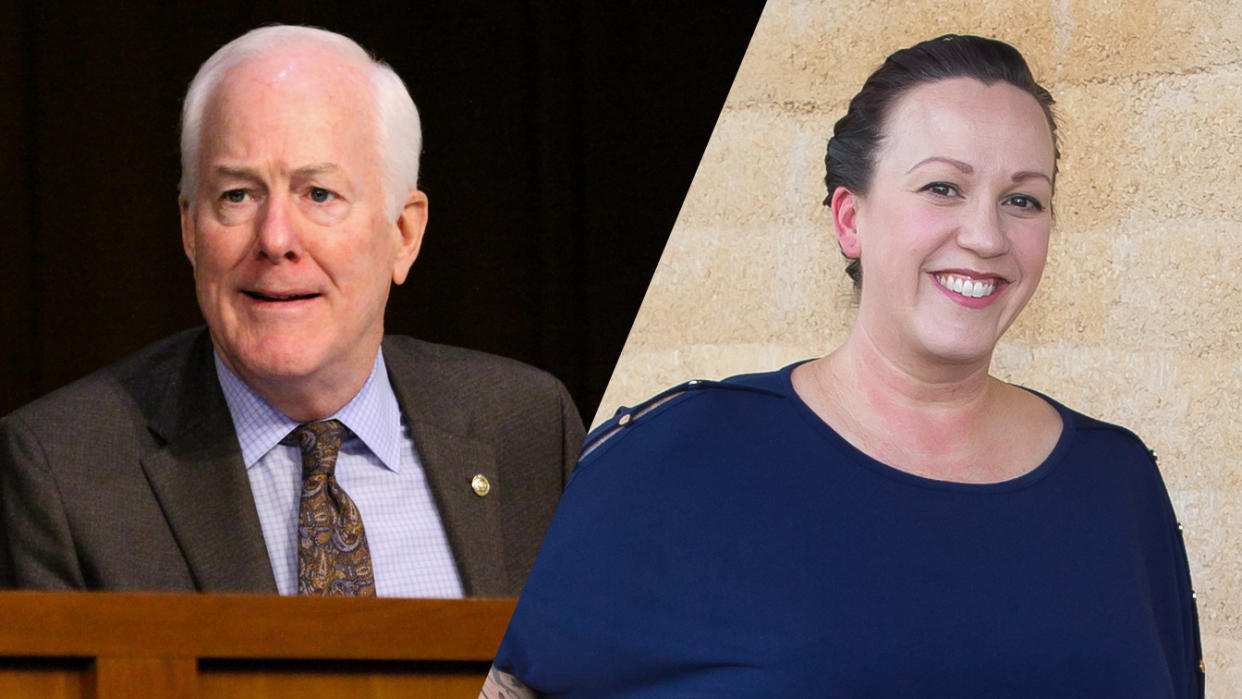
In perhaps the clearest sign that Cornyn may have some concerns about getting reelected, the Republican incumbent recently criticized Trump, admitting in an interview with the Houston Chronicle that the president had “let his guard down” during the coronavirus pandemic and created “confusion.” Cornyn is a three-term senator who has easily won his previous reelection bids, but he’s in a competitive race with Democrat Hegar, a former fighter pilot who narrowly lost a U.S. House race in 2018. In their only debate, Cornyn attempted to tie Hegar to Democratic leaders in Washington, saying she’s too liberal for Texas.
“Hi, I’m M.J. Hegar. I’m a Purple Heart combat veteran and a working mom of two, and I am your opponent,” Hegar told Cornyn in response. “I am the person you’re running against, as inconvenient as that is for you. It’s my ideas and my support in this state that you’re going to have to face in this election.”
Cornyn is likely safe, but Cook moved the race from “likely Republican” to “lean Republican” on Tuesday, and the Biden campaign is starting to spend more on the state. Given that Cornyn’s Republican colleague Sen. Ted Cruz won reelection by just 2 points in 2018, he’s at least breaking a sweat after winning his 2014 race by 27 points.
15. Kentucky: Sen. Mitch McConnell (R) vs. Amy McGrath (D)
Polling average: McConnell, 51 percent; McGrath, 40 percent


Democrats have long fantasized about unseating the deeply unpopular GOP Senate majority leader, who singlehandedly stopped the Senate from even considering Barack Obama’s final Supreme Court nominee at the start of the 2016 election year — then did away with the judicial filibuster and is on the verge of installing a third Trump justice with just weeks to go until Election Day. For a time, McGrath, a former Marine fighter pilot, looked like the only candidate who could do it. But she emerged bruised from a tough primary battle against progressive state Rep. Charles Booker, and despite raising more cash than McConnell, she has trailed by double-digit margins in recent polls. Democrats might make McConnell Senate minority leader next year. But they’re unlikely to get rid of him entirely.
Cover thumbnail photo: Mark Wilson/Getty Images
_____
Read more from Yahoo News:


